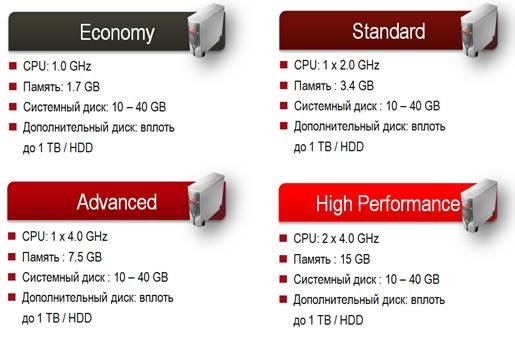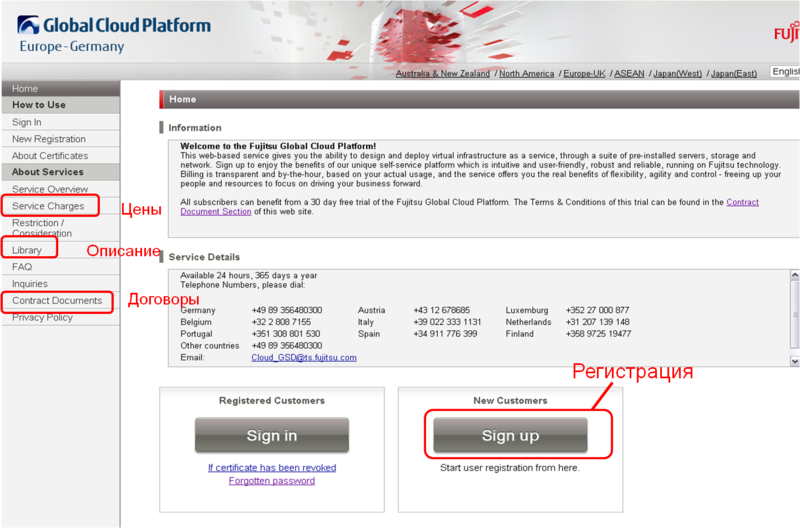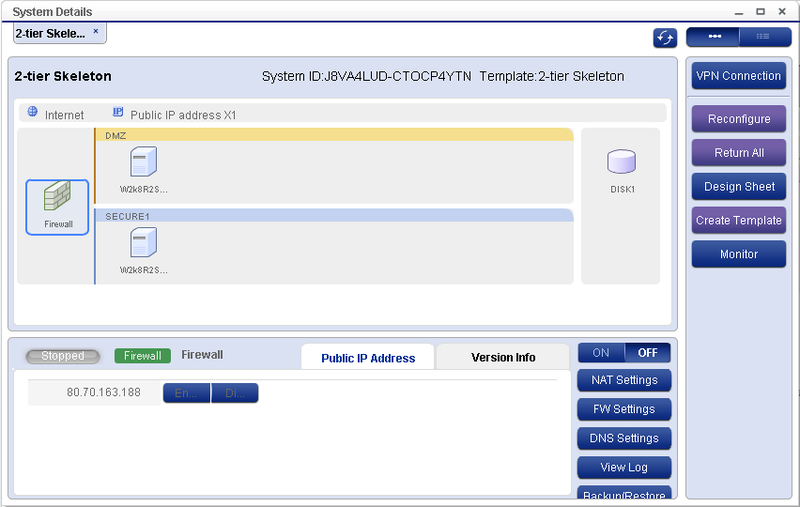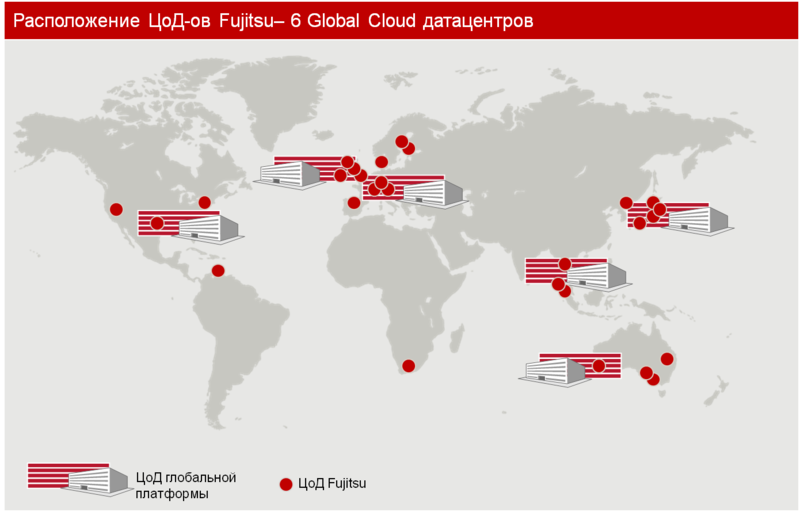Fujitsu Global Cloud Platform
Fujitsu's global cloud platform is an IaaS service that enables users to quickly deploy, configure, and scale virtual data centers. The offer includes virtual machines located in one or several virtual network segments, a firewall that controls the interaction between the created machines, and additional services that ensure the system’s performance as a whole.

Consider the points indicated components
Servers are divided into 4 types by performance:

In addition to the system disk space, which is 20–40 GB in volume, additional disks of up to 1 TB can be connected to virtual machines. In total, such disks can be connected up to 12 to each machine, after which they can be freely moved between servers without loss of information.
All virtual servers are provided with a pre-installed operating system. Currently, the most popular server platforms are supported, the list of which is constantly growing:
Microsoft
CentOS
Linux
There are three options for organizing the network in the system: one-, two- and three-level. Each level represents a separate virtual network.

All levels are interconnected through a firewall, which also acts as a gateway. The systems themselves can also be connected to a single intranet within a single subscription. And, of course, for the system, you can create one or more physical IP addresses and thereby provide Internet access.
A firewall is a specially pre-configured virtual machine that acts as a firewall, gateway, and also responsible for network address translation (NAT). A flexible configuration system allows users to filter incoming and outgoing connections according to the following parameters: connection direction, sender and receiver addresses, used protocols and ports. The direction of the connection is understood as two networks selected as the initial and final. The role of such networks may be the actual network segments of the user system, as well as the Internet and intranet.
Optionally, the user is offered services for load balancing, backup of system components, setting up a VPN connection between systems and the user's local network. The full list can be found on the cloud platform portal: globalcloud.de.fujitsu.com
Consider the processes of creating, managing and monitoring systems.
Management
All work with systems is carried out through the portal: globalcloud.de.fujitsu.com . You can get acquainted with the terms of service and the provisions of the contract, even without an account.

Access to all information - on the resources spent at the moment and their cost, both total and by position - is carried out from your personal account. There are also possibilities for using one account by several users with separation of access rights between them.
Let's move on to the most interesting part - the process of creating a system:

The whole process is based on intuitive actions. First, a system template is selected. In the example above, a template consisting of two subnets has been selected. Required servers are added using the Drag-and-Drop method, the type of their performance is selected from the drop-down list. In a similar way, additional disks and load balancing servers are added. In general, the entire deployment process in the “cloud” for a small infrastructure takes about fifteen minutes, including the system startup time.
The process of reconfiguring the system looks similar. All components and parameters of the system can be changed at any time, the user can delete or add new virtual machines, change their type, transfer between network segments, connect, transfer or delete additional disks.
Systems are also managed through the portal - in a few clicks you can configure the firewall rules, conduct a backup, view the logs, or even delete the entire system.

Management and configuration of the virtual machines themselves is done using standard RDP or SSH protocols. To do this, it is possible to connect the administrator's PC to any of the subnets of the managed system through a VPN connection. There is also an optional ability to configure a permanent VPN connection between user and system networks.
When using cloud servers, it is very important to accurately compare performance parameters and tasks. If an insufficiently efficient machine is selected, it is quite easy to track, and all the symptoms that are called are on the face. In the reverse situation, the procedure is much more complicated. To understand that the requested resources are redundant for current tasks, and in order to save money, a monitoring system helps to switch to a less efficient type of server.

For each individual machine, it is possible to view the degree of its load on a scale of one hour to a week, which allows you to track the degree of server utilization and periods of peak loads.
All management and monitoring capabilities presented on the portal are duplicated through a set of APIs. The console commands of Windows and Linux systems and the Java SDK set make it possible to automate the management and reconfiguration of the system, allowing the user to create their own portals for reselling services or implement automated work scenarios with a sharp increase in workloads.
Terms of Service
Cloud platform Fujitsu is designed, first and foremost, the corporate segment of users, so each registration on the website is supported by a separate agreement on the provision of services. This allows you to guarantee service levels and take into account the specific requirements of users.
Only actually used resources are paid, which is fully consistent with the concept of cloud services. Depending on the types of resources, the charging process may vary slightly. For example, virtual machines are paid for hours of operation, that is, the time when the server is turned off is not taken into account, while the disk space is paid based on the reserved volumes, regardless of whether the disk is attached to any server or not.
Separately, it is worth noting that for each new contract a trial period is provided for a period of 1 month. During this time, the organization can become more familiar with the capabilities of the platform and test the necessary functionality. Customers are also provided with consulting services for launching cloud infrastructure and application migration.
Security
Fujitsu's global cloud platform is deployed in high-availability data centers and organized with load balancing to minimize impact on network performance.
Multilevel network security is provided by a complex of anti-virus and anti-spyware software. The software used is constantly updated, which allows timely detection of all known threats.
How is the security of client systems guaranteed?
o biometric identification of a person,
o full video surveillance,
o redundancy of most systems,
o maintaining the data center in most cases of intentional and accidental human intervention,
o redundant inputs, duplicating access roads, access control, lack of windows, protection against electromagnetic radiation, load-bearing capacity of overlaps not less than 1225kg / m² with load from above and 245kg / m² of load from below.
o ISO 9001,
o ISO 20000,
o ISO 27001,
o ISO 27001 IT Basic Protection,
o GMP (Good Manufacturing Practice),
o §25a KWG.

The Fujitsu cloud platform has been around for years, with several hundred subscribers worldwide. Six data centers around the world provide a standardized service stack for customers at various levels. In particular, Fujitsu's own projects are based on it, for example, a solution for independent software vendors Fujitsu Cloud Store.

Consider the points indicated components
Virtual machines
Servers are divided into 4 types by performance:

In addition to the system disk space, which is 20–40 GB in volume, additional disks of up to 1 TB can be connected to virtual machines. In total, such disks can be connected up to 12 to each machine, after which they can be freely moved between servers without loss of information.
Operating Systems
All virtual servers are provided with a pre-installed operating system. Currently, the most popular server platforms are supported, the list of which is constantly growing:
Microsoft
- Windows Servers (64 bit):
- Windows Server (32 bit):
- Internet Information Server 6.0 and 7.5 (English)
CentOS
- CentOS 5.4 32bit (English);
- CentOS 5.4 64bit
Linux
- RedHat Linux RHEL 5.5 64bit w SPT1 (English);
- RedHat Linux RHEL 5.5 64bit w SPT2 (English);
- Red Hat Enterprise Linux 5.7.
Network structure
There are three options for organizing the network in the system: one-, two- and three-level. Each level represents a separate virtual network.

All levels are interconnected through a firewall, which also acts as a gateway. The systems themselves can also be connected to a single intranet within a single subscription. And, of course, for the system, you can create one or more physical IP addresses and thereby provide Internet access.
Firewall
A firewall is a specially pre-configured virtual machine that acts as a firewall, gateway, and also responsible for network address translation (NAT). A flexible configuration system allows users to filter incoming and outgoing connections according to the following parameters: connection direction, sender and receiver addresses, used protocols and ports. The direction of the connection is understood as two networks selected as the initial and final. The role of such networks may be the actual network segments of the user system, as well as the Internet and intranet.
Additional services
Optionally, the user is offered services for load balancing, backup of system components, setting up a VPN connection between systems and the user's local network. The full list can be found on the cloud platform portal: globalcloud.de.fujitsu.com
Consider the processes of creating, managing and monitoring systems.
Management
All work with systems is carried out through the portal: globalcloud.de.fujitsu.com . You can get acquainted with the terms of service and the provisions of the contract, even without an account.

Access to all information - on the resources spent at the moment and their cost, both total and by position - is carried out from your personal account. There are also possibilities for using one account by several users with separation of access rights between them.
Let's move on to the most interesting part - the process of creating a system:

The whole process is based on intuitive actions. First, a system template is selected. In the example above, a template consisting of two subnets has been selected. Required servers are added using the Drag-and-Drop method, the type of their performance is selected from the drop-down list. In a similar way, additional disks and load balancing servers are added. In general, the entire deployment process in the “cloud” for a small infrastructure takes about fifteen minutes, including the system startup time.
The process of reconfiguring the system looks similar. All components and parameters of the system can be changed at any time, the user can delete or add new virtual machines, change their type, transfer between network segments, connect, transfer or delete additional disks.
Systems are also managed through the portal - in a few clicks you can configure the firewall rules, conduct a backup, view the logs, or even delete the entire system.

Management and configuration of the virtual machines themselves is done using standard RDP or SSH protocols. To do this, it is possible to connect the administrator's PC to any of the subnets of the managed system through a VPN connection. There is also an optional ability to configure a permanent VPN connection between user and system networks.
When using cloud servers, it is very important to accurately compare performance parameters and tasks. If an insufficiently efficient machine is selected, it is quite easy to track, and all the symptoms that are called are on the face. In the reverse situation, the procedure is much more complicated. To understand that the requested resources are redundant for current tasks, and in order to save money, a monitoring system helps to switch to a less efficient type of server.

For each individual machine, it is possible to view the degree of its load on a scale of one hour to a week, which allows you to track the degree of server utilization and periods of peak loads.
All management and monitoring capabilities presented on the portal are duplicated through a set of APIs. The console commands of Windows and Linux systems and the Java SDK set make it possible to automate the management and reconfiguration of the system, allowing the user to create their own portals for reselling services or implement automated work scenarios with a sharp increase in workloads.
Terms of Service
Cloud platform Fujitsu is designed, first and foremost, the corporate segment of users, so each registration on the website is supported by a separate agreement on the provision of services. This allows you to guarantee service levels and take into account the specific requirements of users.
Only actually used resources are paid, which is fully consistent with the concept of cloud services. Depending on the types of resources, the charging process may vary slightly. For example, virtual machines are paid for hours of operation, that is, the time when the server is turned off is not taken into account, while the disk space is paid based on the reserved volumes, regardless of whether the disk is attached to any server or not.
Separately, it is worth noting that for each new contract a trial period is provided for a period of 1 month. During this time, the organization can become more familiar with the capabilities of the platform and test the necessary functionality. Customers are also provided with consulting services for launching cloud infrastructure and application migration.
Security
Fujitsu's global cloud platform is deployed in high-availability data centers and organized with load balancing to minimize impact on network performance.
Multilevel network security is provided by a complex of anti-virus and anti-spyware software. The software used is constantly updated, which allows timely detection of all known threats.
How is the security of client systems guaranteed?
- Data is available only to customers.
- All data is encrypted, and Fujitsu administrators do not have access to customer content.
- Physical access to the equipment is available only to the data center administrators, who are mandatory certified and tested by polygraph.
- Fujitsu provides all security measures for data centers that comply with Tier 3 reliability categories:
o biometric identification of a person,
o full video surveillance,
o redundancy of most systems,
o maintaining the data center in most cases of intentional and accidental human intervention,
o redundant inputs, duplicating access roads, access control, lack of windows, protection against electromagnetic radiation, load-bearing capacity of overlaps not less than 1225kg / m² with load from above and 245kg / m² of load from below.
- All Fujitsu data centers are certified in various areas of security, including:
o ISO 9001,
o ISO 20000,
o ISO 27001,
o ISO 27001 IT Basic Protection,
o GMP (Good Manufacturing Practice),
o §25a KWG.

The Fujitsu cloud platform has been around for years, with several hundred subscribers worldwide. Six data centers around the world provide a standardized service stack for customers at various levels. In particular, Fujitsu's own projects are based on it, for example, a solution for independent software vendors Fujitsu Cloud Store.
